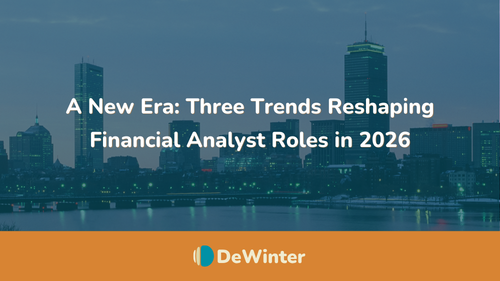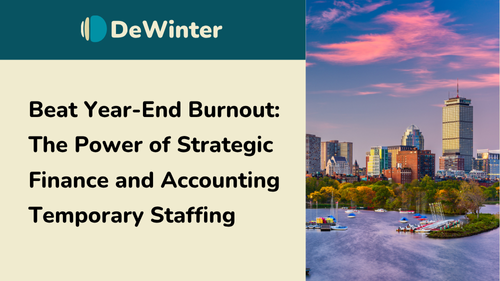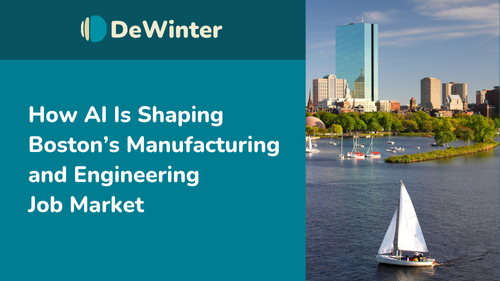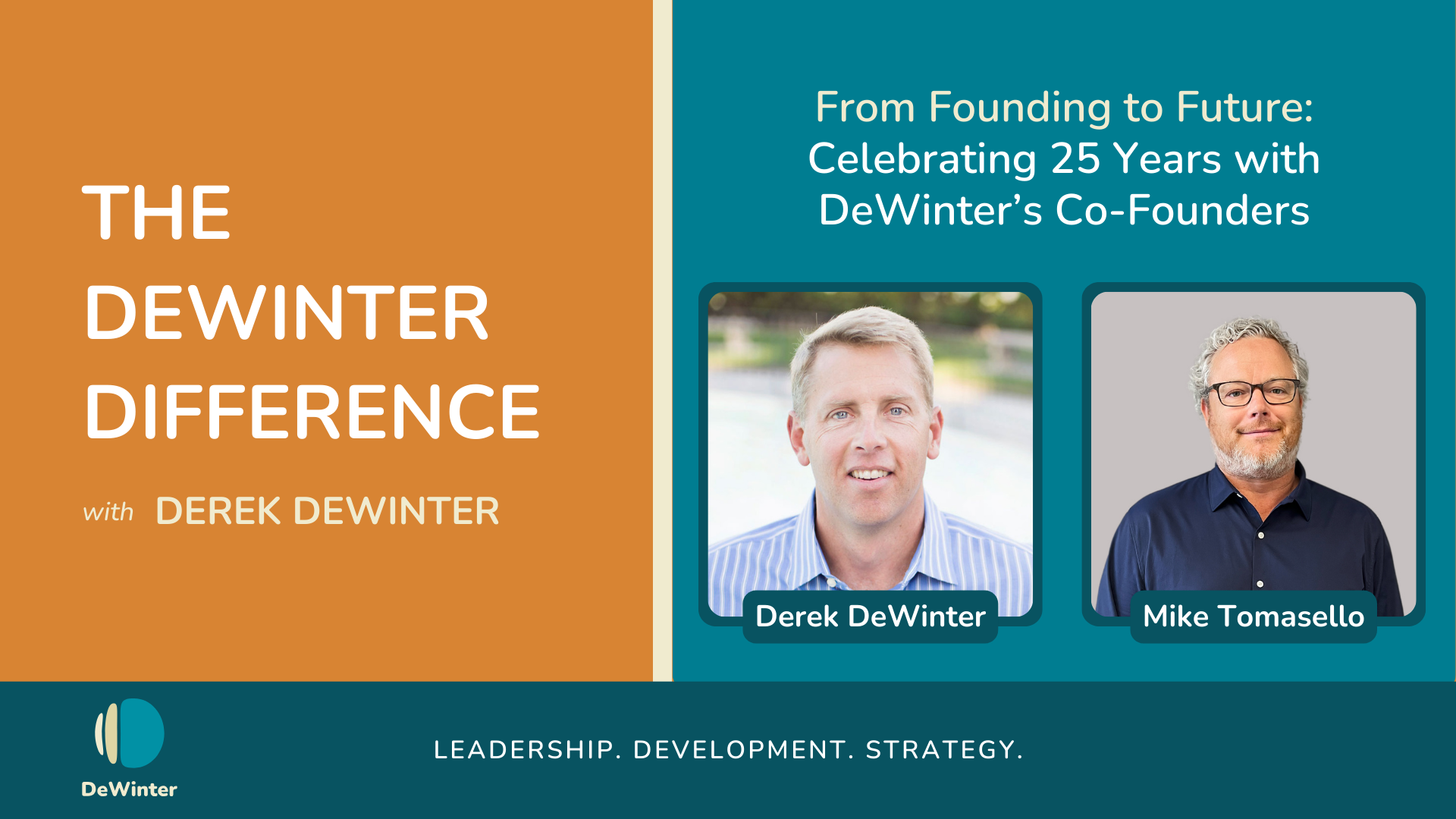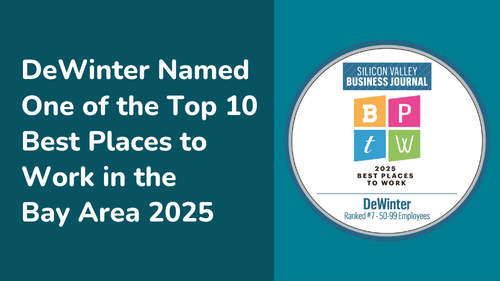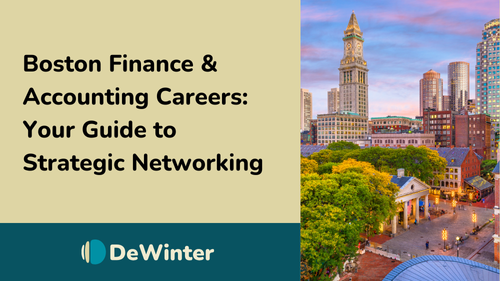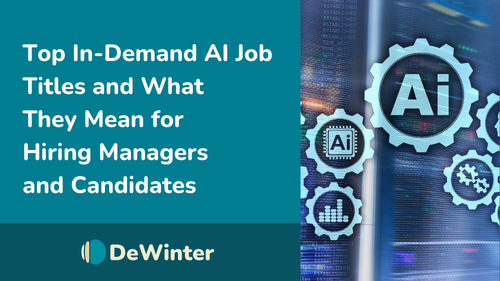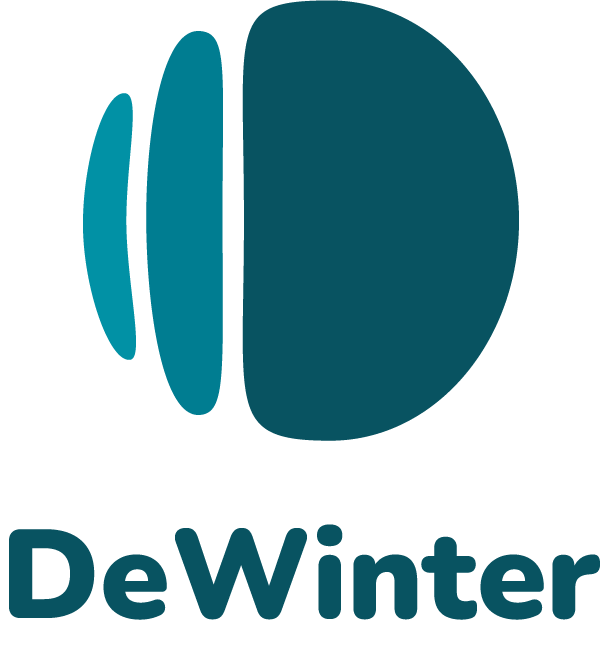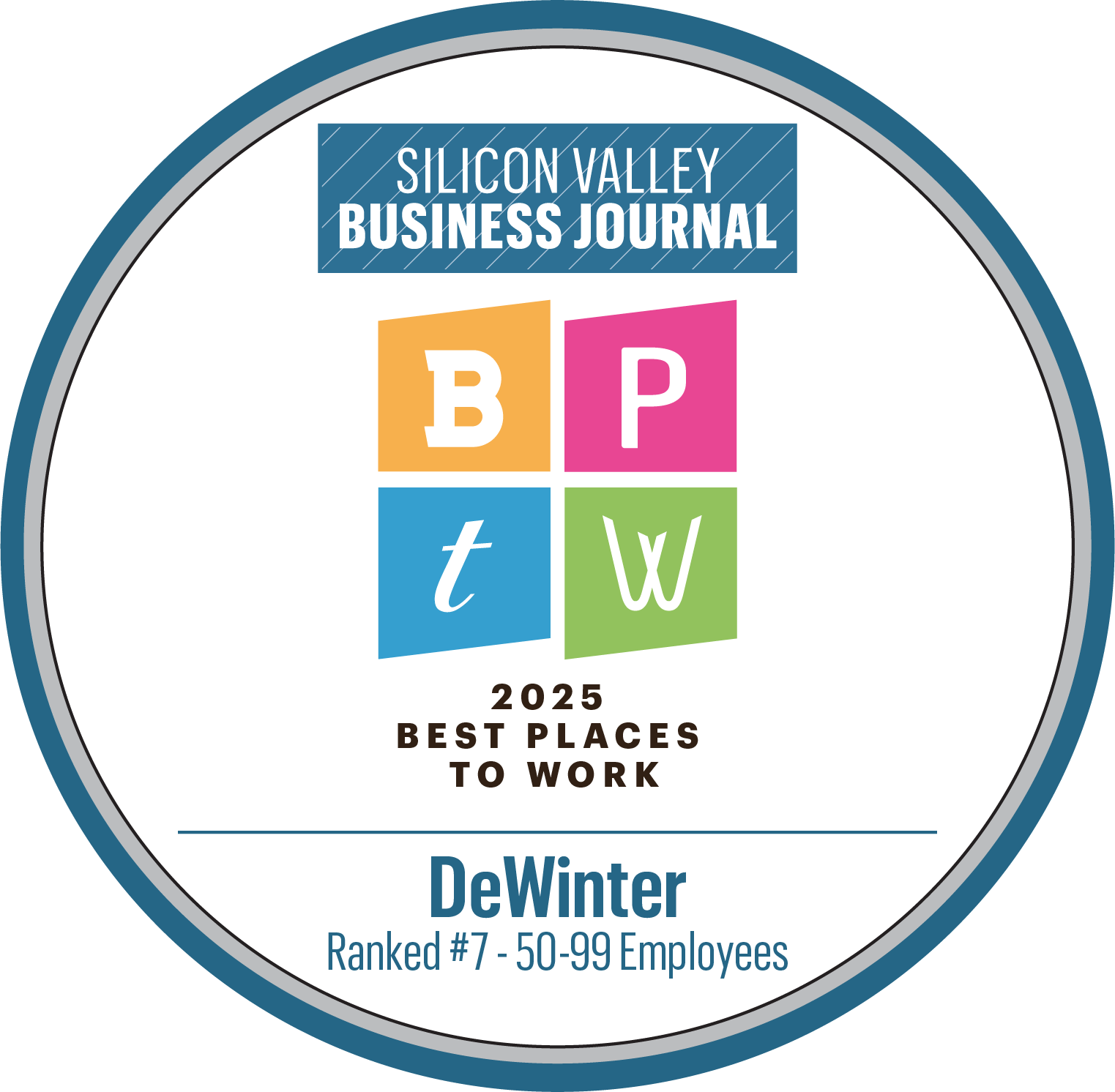The DeWinter Difference: Matt Field, Chief Financial Officer of Joby Aviation
About The Episode
In this episode of the DeWinter Difference, Derek sits down with Matt Field, Chief Financial Officer of Joby Aviation. Matt shares his insights on living and working internationally during his time at Ford, adapting leadership strategies for different team cultures, the skills he looks for when identifying talent, and more.
.
Listen now at the streaming sites listed.
Learn more about the DeWinter Difference podcast here and share your thoughts and comments below.
Episode Transcript
This transcript has been edited for length and clarity.
Matt Field
Derek DeWinter: Welcome to our listeners who are tuning into The DeWinter Difference, an audio podcast where I spent a bit of time with incredible executives I've worked with, and you get to listen in. I hope that our conversations are unique and insightful, short enough so you don't respond to texts and emails while listening, but long enough so that you get some great takeaways that you can apply in your own career, life, and relationships.
Today, I'm very pleased to speak with Matt Fields. Chief Financial Officer of Joby Aviation. Prior to Joby, Matt spent two decades at Ford Motor Company holding positions with progressive amounts of responsibility, both nationally and internationally, and led teams of as large as 1,000 people. He joined Joby in 2021 to help steer them towards a public offering in 2023.
Matt, thank you so much for taking time today to chat.
Matt Field: Thanks. Just one correction. We went public the same year I joined, so 2021.
Derek DeWinter: Yep, there you go.
Matt Field: We have been public for a couple of years now.
Derek DeWinter:
Well, you know, true to form, we're gonna not even edit that out. We're gonna, leave it as is because we all make little mistakes and I'm full of them. So that would make, that makes sense. It's 2023 now, of course.
Matt Field: Can't believe it's been a couple of years already.
Derek DeWinter: Yeah. Well, maybe that's what I was thinking. So for those of you who are busy, you know, checking out LinkedIn to see who Matt is and where his background is I will help set the stage a little bit with kind of an interesting intro. So, Matt, you're in Dearborn, Michigan sometime in late 2020. It's cold outside, maybe snowing, maybe a little sleet.
Either way, it's winter or winter is very fast approaching in the Midwest. The phone rings, you pick it up and someone says to you, cars on the road are so yesterday. What do you think about living by the beach and working at a company building flying cars? Now I'm sure this isn't exactly the way it played out, but I would love to hear how the initial conversation went, and your transition to a company as unique and interesting as Joby.
Matt Field: Yeah, so you're right. So, you know, this was many people through 2020. We were all working through COVID. And for me, that meant working in the basement and so one of the unique things about automotive, and there are just a handful of industries, I think, that are like that, that it really shuts down between Christmas and New Year's.
While teams are working and doing stuff and you're responding to emails and so forth, it's not the usual pace. You have, you know, 12, 14, 16-hour days or 18 to 20-hour days during some of the peak coven times. And so I did get this phone call and usually, you know, I always listen to people and say, understand where their perspectives are.
This was something I just had never heard of before. Didn't know the industry existed. It wasn't on my radar, but I've always been, you know, a bit of a history buff, a bit of a business buff and when transportation changes, it changes fast. So I wanted to learn more because really Joby was moving into that next generation of transportation, but doing it already starting from a sustainable place. So, I was just curious to find out more, met the leadership team, met the whole board, and was really impressed with the culture and the people impressed with the mission you know, understanding where they were on the technology spectrum and also where they were relative to others was important.
They just ticked all the boxes, something that sounded like, if you look, if you kind of project yourself forward and look back. Was this something you feel like you'd miss out on if it was successful and you weren't part of it? And so I talked to my wife, talked to the kids, and decided it was worth pursuing.
Derek DeWinter: Have you ever actually been to the Santa Cruz area before?
Matt Field: No, but my wife and I met at Berkeley. We went to Berkeley for grad school. Both were MBAs there. And so we met in class. And so we knew the Bay Area fairly well, but I'd never been to Santa Cruz. I'd been to Monterey to the aquarium once before. I've been down to Big Sur for some camping but have never been to Santa Cruz.
It was, it was a bit of a leap of faith because of COVID and everything else. Yeah, I did everything virtually in terms of making this decision. So it was a bit of a bit of a surprise to drive over the mountains and see the ocean. I mean, I knew that I knew all that was there, but it was still delightful to see it in person.
Derek DeWinter: I'm sure there are probably more similarities and there are differences between work at Ford and work at Joby. It's surely more fun to talk about the differences. So what are some of the things that immediately jump off the page to you about, you know, life and leadership and the finance function that Joby versus Ford?
Matt Field: So Ford, you know, it's a wonderful company with a rich finance tradition, and that means there are so many processes that are established. I mean, I don't remember what forecast number we were on, but we used to do a monthly forecast and it was like a forecast, I don't know, 868. You could actually count on when that process started because it would have been 868 months so it really started, a lot of those foundations started post World War II, which was a great training ground on so many fronts, and automotive is just a wonderful industry because you learn so much, it's so complicated.
So, you know, leaving that infrastructure and that talent pool where you had, as you said, like a thousand finance people in the US many of whom have been there and they've grown up in the company and there's just such experience, but also wisdom and, you know, moving to Joby I think I walked in and the finance team was maybe six or seven people. It was a chance to grow a new team, establish processes, take the best of what I learned, plus kind of look more broadly and say, well, what, what do I want to change? How do we want to adapt? And, and build those processes into a new culture.
The other thing that's been surprising to me is at Ford, so many people grew up in the system that everyone knew a bit of their, i'm not going to say swim lanes because you really blur lines and finance and other functions as you work on cross-functional teams. Here at Joby, so many people come from different companies because we're building a company that's all new and so you have a real mesh of people. Figuring out, you know, what does finance do, what does manufacturing do where's what, when everyone knows kind of what legal does, but, you know, everyone working together from, from not a shared history of a corporate culture so there's a real melding and evolution that comes from that I didn't actually expect, but it's been really delightful.
Derek DeWinter:
That's awesome. It's speaking of, you know, Adapting and you know, using different attributes and different sizes and shapes and types of organizations. Let me, let me try to set this question up here with how you would spend some money. So let's pretend you have 100 in your pocket and it's the only money you have to purchase attributes that you believe have made you a successful, successful executive.
The more you spend on a specific attribute, the less you can spend on others. So if I believe that flexibility is the single most important attribute I possess, then I might want to spend 80 on that. And then I would spend 20 on other things. Where do you believe you would start allocating your money?
Matt Field: I did listen to your other podcasts that you did with other people. They were, they were amazing. They were, they were great to listen to. Hopefully, this one comes off as well. So I was thinking about this one night I couldn't sleep earlier in the week and was thinking well, that's a really good question.
Where would I put the money? I think honestly, these percentages change over time in your career. But at this point, this is kind of where I would balance the budget. First
Derek DeWinter: You would be a finance executive. Oh my God.
Matt Field: Exactly, hopefully, it adds to a hundred because you know so I'd start off with hard work and accountability.
I think you can't be in finance. You can't you can't get to these levels without working hard, but also being accountable, for delivery. And these first three, I'm going to say are kind of three-quarters of my budget and I went back and forth between you know, what exact ratios, but we'll just say this, this bucket is kind of three-quarters and it's, it's how I think of it as how do you work with others.
So hard work and accountability first, that's, that's core to, for me, what's been really important is respecting other people listening, but also being curious. So I'd put that in kind of that second bucket of the three quarters because. You really, what I've found in my career is finance because you're so broad across the organization, you can take other perspectives and translate across functions or across people and hear where people might not be communicating the way they think they are. That has to be tied to respecting viewpoints, but also being curious to learn. The third piece of that, which I think supports the other ones, is having trust. Trusting other people, but also respecting other people's trust in you and being approachable. I truly believe, you know, that old finance doctor, no, really doesn't work so much anymore because if you've got problems, you want people to bring them to you if you're not approachable, you really, I don't think you can really be successful in finance today in big complicated companies.
So that's kind of the first three quarters is those three foundational elements. Then the last 25 percent I would say is what really makes a difference above and beyond that.
And that's you know, maybe spread it equally. Maybe there's a little bit of different weight in there, but there's mentorship and advocacy because you do need to build teams, you need to train people, you need to identify talent. At Ford, you had such a big pool that you were kind of identifying talent in the pool and advocating for people. At Joby, it's about training the people you have, but also finding people outside that you want to bring in. So a little bit different.
Derek DeWinter: Yeah. Cause I would imagine much of the team that you worked with at Ford. It's from Ford.
Matt Field: That's right. So you had this natural pool that came in every year that was refreshed. And so really. My job as a manager and eventually senior leader was trying to find the best of the people coming in. I still went out and recruited people, so I was active in recruiting, but, at some point, it was like, okay, who, at what level is driving things the way and behaving the way you want to, to kind of grow an organization. So, so very different.
Derek DeWinter: So you have led teams as large as a, as a thousand and there'll be people listening to this audio podcast. Hopefully, a bunch of them work at companies that aren't near a thousand people, let alone finance organizations that are a thousand people. So you have kind of a very, very crazy unique perspective on leadership that probably a lot of people can't even quite imagine. Are you also given that you worked at Ford and held different positions outside the country and probably did an excessive amount of travel as well? You've been to a lot of different places and a lot of different countries and sold in different countries and what have you.
So I'm curious from, through your lens, what are some of the more unique countries, good, scary, otherwise, that you have been in and how difficult have some of them been to work in?
Matt Field:
So I was fortunate to work and live abroad we actually, when our, when our kids were young, I think we were about two and a half and four we moved to Bangkok working with Ford, and then three years later moved to Shanghai, we were there for four years and came back from, from Shanghai in 2013 and then had various roles and international responsibilities throughout. I want to say any place was particularly difficult in the sense that, you know, It was infrastructure with the company in every country we operated in. We'd been places for, you know, 100 years, so you had local relationships. I think what was really important was thinking about your own leadership style and how you interact with teams and build teams in different places because again, in Bangkok, when I first arrived, I tried to bring the same leadership I had in the US to Thailand. And I had a 60 percent quit rate on my team. And so I had to really rethink, well, what's not working and talk to people who've been there for a while and find mentors that I could talk through.
Well, how do I change my approach? How do I change how the team is developed? And so restructured the team in a way that allowed people to come up to speed faster, and spend more time on training. And so really it was thinking about how to Both how do I change my leadership style. But how do I recruit the right people?
How do I work with different cultures? Because we had team members in Japan, we had team members in India, had team members in Brazil, and Germany. How do you work across those cultures? It really came down to a bit of what I said at the beginning when you gave me my dollar to spend. Which was, you know, respecting people, listening, seeking to understand it was also just, you know, being resilient when you face failures and kind of forgiving yourself and others and then adapting.
So, you know, I wouldn't say anything, everything was a challenge, but I wouldn't say anything was bad. You just have to learn and adapt as you work through different cultures, which is a great growth experience. I recommend working and living abroad for everybody.
Derek DeWinter:
Do you think that there's been a shift in the way other countries have looked at the U. S. from a purely business perspective over the years? I don't. I don't know that I'm asking that the perfect way or you can maybe you'd have to be in Thailand, you know, and then go back 10 years later to see exactly how things have looked or look differently. Do you think there's been a perceptual change in the way that some countries look at the U. S.?
Matt Field:
You know, it's a great question. I think there's an ebb and a flow to that. There are elements where I think people look at the US the same way they always have, which is a great educational system, and a wonderful place to start things and grow things, but also I think internationally, those opportunities are now evident, right?
India has always had a really strong educational system, but it's now getting to be more entrepreneurial, and more tech-forward. Now people are starting things in India, whereas they might've started in the U.S., the same in China, same elsewhere. I do think people are seeing differences more, unfortunately, which I think is a real tragedy, both in the U.S. and abroad. I think some of those seeing differences instead of commonality is creating more hesitancy for international collaboration at kind of the corporate business level. Which is a real shame because there's so much opportunity, to change the world, to have opportunities, and so forth. I do look forward to a time when there are high degrees of respect, collaboration, and teamwork globally.
Derek DeWinter: Knock on wood. Absolutely. You can't open up the paper, but I don't know that anybody opens up the paper anymore, but you can't turn on your computer, go to a newsfeed, or hear a company X, Y or Z talk about their business without AI being a part of it these days. It's having an accelerating impact on our lives, work, and everything in between. Are you excited about the impact it has on your functional job or are you as nervous as you are excited or,, or concerned, or a whole mix of things?
Matt Field: I think you can't be excited without also being concerned. What you see in some of the digital imagery and so forth can be concerning, but I'm really excited overall because whenever you see new technology, other than bad, you know, spell corrects on my Apple techs, which sometimes are quite humorous and fun to enjoy.
I think the role AI will play. We're just seeing the tip of the iceberg, whether that's programming you know, helping you write things. I was talking to another CFO a while back and we were talking about Chat GPT, and he's a small company as well he said, well, I needed a job description for a role.
I just Chat GPT it and then I edit it. I thought, well, that's brilliant because of job descriptions. You know, they're not rocket science and so, you know, something like that is a perfect way to save yourself some time. I think you think about that more broadly, whether that's on the accounting side, the finance side, the policy side, the legal side, throughout organizations.
I think there's tremendous opportunity for AI and we're probably just starting to scratch the surface. That doesn't mean there's no risk and concern as well. There's a lot, there's a lot here to unpack a lot of opportunity, probably more so than blockchain, which was the big thing a few years ago that never really seemed to quite get there.
But AI definitely feels like it has legs for the long term.
Derek DeWinter: I definitely do not want to talk about blockchain technology. The level of complexity and the wide eyes that you would look at and when you look at me when someone tries to talk about it, like, oh my gosh.
Matt Field: Definitely seems like it hit its hype cycle and never quite recovered.
Derek DeWinter:
A blockchain expert would dispute that, of course.
Matt Field: Someone out there is gonna send you hate mail, Derek.
Derek DeWinter: I get a few. So what would you be doing if you weren't a CFO?
Matt Field:
My dad was a professor and I love working with people. I think I would teach, I really think that's not only a valuable profession that makes a huge difference for people, but I just like it. I love reading, I love learning. You know, I've even thought about at some point when I retire, is that something I want to do? But I think teaching, you know, being a professor, training the next generation of business leaders. That's probably where I lean
Derek DeWinter: Gotcha. Well, I've been able to ask you a whole bunch of questions. So we get to turn the tables now and we get to do, you know, the fun, interesting, scary part for me is you get to ask me a question. I don't know what it is. Hopefully, I won't embarrass myself in the response.
Matt Field: I'm sure you'll do better than I have.
Derek DeWinter: I doubt that.
Matt Field: You know, one thing I've always wondered about, and I don't have to worry about it here because every day is different and there's so many new and exciting things to do, but, as I think about how you stay. From avoiding complacency to avoiding stagnation, one of the things that I truly believe is you have to have something that you feel like you're not successful at, like some side hobby or something that keeps you out of your comfort zone.
This is actually an idea my wife highlighted to me many, many years ago through some of the Angela Duckworth kind of grit and perseverance stuff. So I guess my question is, what do you do to keep yourself? Out of your comfort zone so that you keep that mental flexibility, that energy, and from kind of stagnating.
Derek DeWinter: Well I've been doing this for 30 years, so there's a natural part of my job that is redundant. The new stuff is, that everybody's new every conversation is new, every client is a little bit different, and every client is different at different life cycles of being a client, and every candidate is different at different life cycles of being a candidate.
I've known candidates that were you know, two years out of public accounting who are now CFOs and now we've worked with their kids and so our, you know, the, our days as recruiters, headhunters, executive search, they're all very, very different because we're dealing with very different people.
So we're, I think we're fortunate in that regard that everything is a little new all the time. I also have three children on the personal side of things, so that every day is different and new. So I'm almost constantly out of a comfort zone there as much as I'd like to think I keep things together. There's not a day that goes by that I'm not challenged in some capacity there. I think as I get older too, I also think I've got less time left in front of me than behind, you know, not to be a buzzkill, but it's true. I’m 52, so I'm trying to think of the things that are really valuable to me going forward that I feel like I better get, I better get on this, which is either learning another language or playing the ukulele or, or whatever it might be, and I think those are things that you constantly need to flex for sure.
Matt Field: That flex piece that to me that's where that kind of, because we all have challenges and you're right, kids job, new colleagues and stuff, but it's that flex piece that I think that's that constant growth of feeling like you're striving to be better at something where it's okay to be horrible at because you don't know how to play the ukulele yet.
Derek DeWinter: It is great to be bad at things. It is just wonderful. I mean, you want to get better, obviously, but like, I don't know if you're, it makes everybody a little bit more human. Nobody's perfect out there. Last time I checked. So, do you know Dr. Emmett Brown?
Matt Field: I don't.
Derek DeWinter: This is good, this is a kind of a trick question here for you.
Dr. Emmett Brown said, and I quote roads where we're going. We do. We don't need roads back to the future. Do you guys not reference Back To The Future?
Matt Field: We do. It comes up. It comes up a lot. I have to admit Back to the Future is a very popular topic here. You know, it's a very science-based company. A lot of analogies to back to the future. Star Wars, Star Trek. We definitely don't need roads. We need landing
Derek DeWinter:
There you go. Maybe, maybe Joe Ben should dress up as Dr. Emmett Brown one of these days and someone else can be a Marty McFly. So have you been in one?
Matt Field: So just this year we actually flew with a pilot on board. And so, you know, we're progressing our certification process as we speak and eventually, I'll get in one. As the advice of one of my Ford colleagues told me when I was, when I was leaving a very senior engineer, a wonderful human being, said, Matt, my only advice is let the engineers get in first. I think that's good advice.
Derek DeWinter: He has brilliant advice. Absolutely.
Well, Matt, you are a busy man with a lot going on. You made time for us to have a conversation, which I appreciate. We haven't known one another that long, but I look forward to many, many, many more years of conversations like this and visits and, and what have you.
It's been a real treat today having this conversation and I'll let you go back to being the successful financial executive that you are and really appreciate your time.
Matt Field: Well, thank you so much, Derek. Let me know when you're back over on this side of the mountain.
Derek DeWinter:
Yeah. Done deal. We'll take care. Thanks, Matt.
Matt Field: Hey, thank you so
Derek DeWinter: All right. Bye

